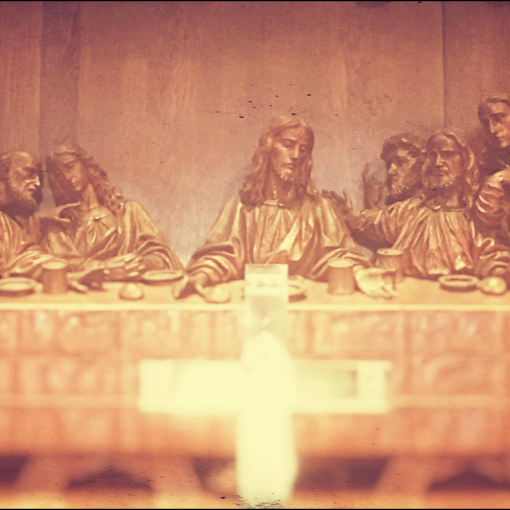[This is sort of a “rough cut,” intended as a detailed outline rather than a full narrative exposition. Still, feel free to read and comment!]
Second Sunday of Advent
Year B
RCL
Isaiah 40:1-11
Psalm 85:1-2, 8-13
2 Peter 3:8-15a
Mark 1:1-8
Merciful God, who sent your messengers the prophets to preach repentance and prepare the way for our salvation: Give us grace to heed their warnings and forsake our sins, that we may greet with joy the coming of Jesus Christ our Redeemer; who lives and reigns with you and the Holy Spirit, one God, now and for ever. Amen.
We are just a few weeks away from Christmas Day and the children and perhaps more than a few adults are wondering what they are going to find in their stockings and under their tree when they wake up. What are you expecting? What are you waiting eagerly to unwrap and enjoy?

There is no doubt that anticipation is building. Even with our current economic struggles, people are pouring into the stores to snap up bargains. The ads on television and in the papers make even the most ascetic among us twinge with at least a bit of desire. As much as I would decry commercialism and the excessive lust that such advertisements induce, I think the anticipation and heightened state of expectation that it creates in us can and should serve as a reminder of what this season really is about, yearning for and expecting the coming of Jesus.
This is the season of expectation and preparation. As we discussed last week, advent, the Latin term means “coming,” denotes this season when we await the coming of the Messiah, God’s anointed one, who will bring us salvation from our sins, restoring our relationship with God. On the most obvious level we are, of course, remembering that Jesus the Messiah came to earth as a human baby born in a manger, but this season is also to be a time of preparation and looking forward to his coming again, as Christus victor, the conquerer of death.
Mark, the earliest of our Gospels, opens with the pronouncement that Romans and Jews alike would recognize. Ἀρχὴ τοῦ εὐαγγελίου Ἰησοῦ Χριστοῦ [υἱοῦ θεοῦ], “The beginning of the good news of Jesus Christ, the Son of God.” As more than one commentator has pointed out, the use of the term euangelion, usually translated as “gospel” or “good news,” would have had very particular connotations for Mark’s audience. Euangelion was a term that indicated the good news of a royal birth or a stunning military victory. “Euangelion – the word might go out – the Emperor has a newborn son who will one day rule the empire. Or, Euangelion! Caesar has won the victory and brought peace and prosperity to the empire.” 1http://rooppage.blogspot.com/2008/12/sermon-2-advent-2008.html The good news that Mark is declaring is the arrival of the messiah, but while this Euangelion is the good news of both the birth of the king and his victory, it came in a way that defied all expectations.
In the years leading up to Jesus’ birth Jews were remembering passages such as that read from the prophet Isaiah this morning. This passage in Isaiah was proclaimed to Israel living in exile and declared that God would return them to their land and that he would restore Jerusalem. The Lord had not forgotten his people, he would restore them. These are great passages of hope and promise that Jews looked to in dark times, holding to the promises of God.
Now Judah was again occupied, this time by the Romans, and the Jews again turned to Isaiah and remembered God’s promises. Passages that told of God sending a descendent of David who would restore God’s rule and order and, most of all, God’s justice. Their hopes and expectations were for deliverance from very real and physical oppression. They looked around and saw suffering and hardship, the poor and the hungry, people being arrested and tortured for their beliefs (cf. Macc.) and called out for God to send his promised Messiah. And they looked for a king, a mighty warrior like David who would defeat the Romans and bring a new Jewish dynasty to the throne.
But others, like John the Baptist, looked beyond this world and declared that God’s Kingdom, not David’s was near and immanent. The Kingdom of Heaven was upon them. Their expectations had to be adjusted and preparations had to be made in order to enter into this new Kingdom.
In those days John the Baptist appeared in the wilderness of Judea, proclaiming, “Repent, for the kingdom of heaven has come near.”
Advent is not yet Christmas. We are not ready for it. This season, like Lent, is a time of preparation and we must heed John’s call and repent. This means that we must take stock of our lives, consider our sins, how we have disobeyed God and hurt him and our neighbors, and ask for his forgiveness.
Sin is a topic that we don’t often preach on and I think it makes most of us uncomfortable. We of course confess our sins as part of our service and we renounce “sins and wickedness” in the baptismal vows that we make, but that is in the abstract and formal setting, where we can manage it. We don’t want to be considered judgmental and so we shy away from identifying sin. After all, “let the one who is without sin cast the first stone” and “judge not lest ye be judged,” right? Right. We have all sinned and God is and will be the judge. But that doesn’t remove our obligation to consider, reflect, and confess our own sins.
What is sin? Simply put, it is disobeying God. When we do what is wrong we have sinned. Why is it important that we recognize that we have sinned? Because we cannot be in a proper relationship until we do so and ask forgiveness. Now when we are talking about God it can seem very abstract and even very relative (“that may be your view of God, but I don’t believe in a God who would say that this is wrong”), but consider it with regards to a friendship, a marriage.
A husband and wife are in a covenant of marriage, a promise to love one another mutually and to share their physical affections exclusively with one another. When one breaks that trust, whether through infidelity or simply disregard, the relationship suffers and is damaged. If the relationship is to survive the one who has broken that trust must apologize, ask their partner’s forgiveness and change their way of living.
So it is with God. He calls us to a holy life, lived in obedience to him and in service to others. We are sinful and so we damage that relationship. John the Baptist continues to call to us today, urging us to prepare ourselves for the coming of Christ. We do that by repenting of our sins and accepting God’s forgiveness. And when we have repented and been baptized our condition will be known by the fruit that we bear, fruit that is worthy of repentance (Luke 3:7-8).
This fruit is charity, love for one another, even and especially those we do not like. (Never forget, liking and loving are two very different things! God calls us to love others, not to like them.) We should strive for righteousness and justice in all things and at all times and we must never forget that our own righteousness comes solely through the sacrifice of the son of God, who “emptied himself, taking the form of a servant, being born in the likeness of men, humbled himself and became obedient unto death, even death on a cross.”
As we decorate our homes in preparation for Christmas, let this also be a meditative and contemplative process. Let the ornaments that we hang upon the tree cause us to consider what fruit of repentance we are producing. As we hang evergreens and put up our tree may it remind us of the everlasting life that we have in Christ.
Advent is a time of great expectation, preparation, and great joy. And our joy flows most freely and deeply because we know that we have indeed been forgiven by the one who came as baby to give his life for ours.
Amen.
- 1http://rooppage.blogspot.com/2008/12/sermon-2-advent-2008.html





